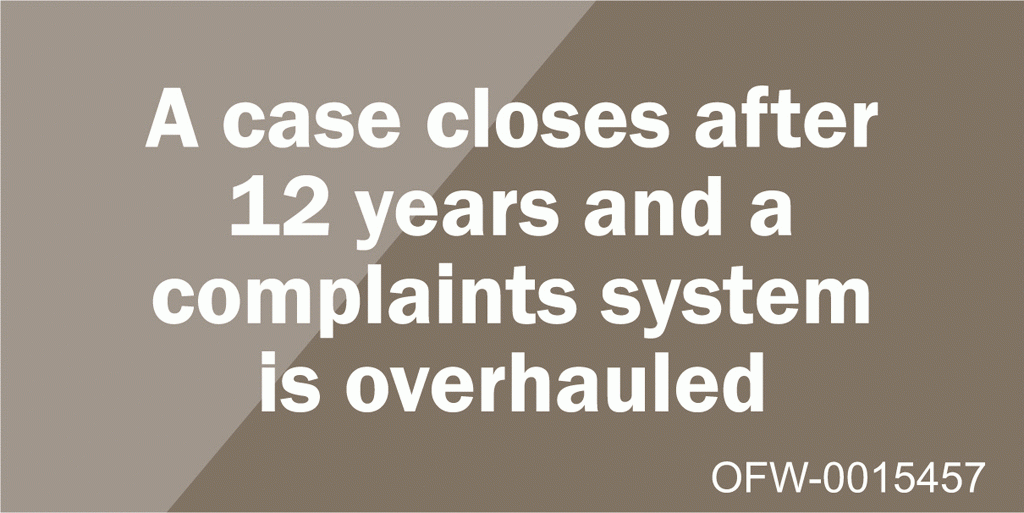Case number
OFW-0015457
Summary of case
Click the image above to get the story.
We investigated allegations that Severn Trent Water might have been in breach of section 94 of the Water Industry Act 1991 (the Act). Section 94 of the Act requires a wastewater company to effectually drain its area and deal with the contents of its sewers. This only applies to the public sewer system.
We received complaints about instances of sewer flooding; odour from sewage; and alleged hydrogen sulphide poisoning from two residents of a small village in Derbyshire, potentially affecting a row of 23 properties. The incidents started occurring around the year 2000 lasting until around 2012.
Throughout this prolonged period, the residents complained that they had to actively unblock their private sewer to prevent sewer flooding at their properties, suffered from odour from sewage on several occasions and were unable to use their garden especially in summer months because of odour from sewage. They alleged that Severn Trent Water had connected an apartment block upstream, draining into their private sewer, without permission. One of the residents no longer inhabited their property due to worries about the potential harmful health effects of hydrogen sulphide.
Between 2004 and 2009, the residents complained a number of times to Severn Trent Water. The residents also complained to Ofwat (in 2008), and at that time, we referred their complaint to the Consumer Council for Water, the industry body who represents customers and mediate on their behalf with water companies.
In spite of having complained to Severn Trent in multiple instances, not all of their complaints were logged on the basis that this involved, in part, a private sewer. However, the crux of the dispute is that the residents remained frustrated that Severn Trent had connected into their private sewer without permission, and that it refused to deal with the ensuing problems caused by this connection.
All of these issues came to light when the residents complained to Ofwat again in September 2011 as part of the appeals which they submitted to stop Severn Trent Water from adopting their private sewer.
Summary of Ofwat’s process and final decision
The sewer system that we investigated consists of an upstream public sewer which drained into the residents’ private sewer, the latter which then connects into another public sewer downstream.
In July 2015 we appointed a consultant to carry out odour monitoring at several points along the sewer and in two houses in the village, to test for the presence of hydrogen sulphide. During 2014 and 2015 we also gathered information from Severn Trent Water and the residents. This took the form of email exchanges with Severn Trent Water about the sewer system and its understanding of the issue; formal requests for information from Severn Trent Water to ensure we received the right information from them; and communication with the residents including a meeting with two of the residents to understand the nature of their complaints and to collect evidence from them.
In December 2015, Severn Trent Water provided us with a commitment that it would install a new sewer upstream of the residents’ private sewer. We therefore agreed to suspend our investigation until that work was complete, and we received confirmation at the beginning of November 2016 that the work had been completed.
Severn Trent Water also committed to make goodwill payments to affected residents for their frustration that this matter had not been resolved over a prolonged time period. All of the affected residents have now received payments from Severn Trent Water.
It is clear to us that Severn Trent Water provided the affected customers with a very poor customer service during its handling of this complaint. As a result of this complaint and our resulting investigation, Severn Trent Water has overhauled its complaints system, especially the way it deals with long-standing complaints – appointing senior managers to look at these to escalate them and ensure swifter resolution.
We reviewed all of the evidence, including the evidence of the consultant, to consider whether Seven Trent Water had breached section 94 of the Act in this case. We concluded that the evidence was insufficient to proceed further with enforcement action against Severn Trent Water in this case, particularly in light of the steps it had taken to remedy the situation.
We wrote to all parties to let them know the outcome of this case on 13 December 2016.
Wider lessons for companies and customers
- Companies should adequately investigate all customers’ complaints – and provide them with a swift resolution within an appropriate timeframe.
- Companies should keep a full record of all customers’ complaints they receive on their system, even if such complaints do not relate to public sewers.
- Companies should communicate with customers who have made a complaint proactively and frequently. Where relationships have broken down, companies should do their best to repair those and restore trust and confidence in their service.
- When we seek information from companies for the purposes of investigating a complaint to us, companies, as required by their licence, should submit accurate and consistent information to allow us to fulfil our role in dealing with specific complaints.
- More information on how to complain and our role is available on our website at ofwat.gov.uk/contact-us
Relevant powers
Sections 18 and 94 of the Water Industry Act 1991
Date opened
05 November 2014
Date closed
13 December 2016
Key documents
N/A
Enquiries
If you have a query about this case, please contact [email protected]
Media enquiries should be directed to the Ofwat Press Office: 0121 644 7642 / 7821 / 7616 / [email protected]
Similar cases
N/A
